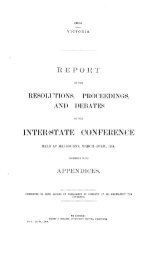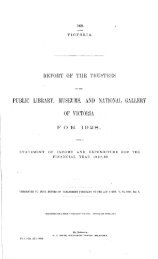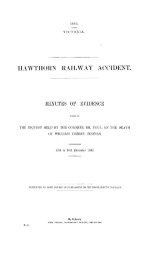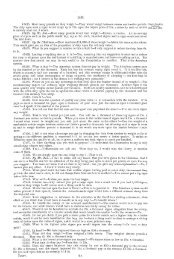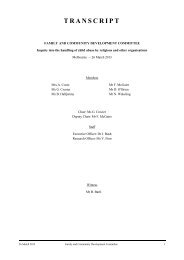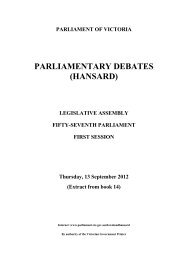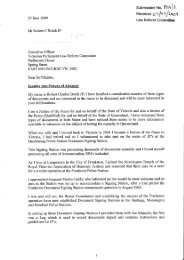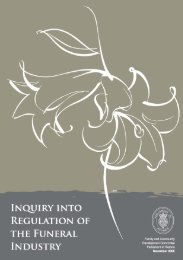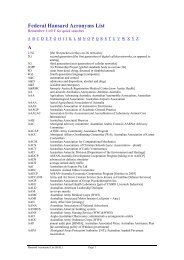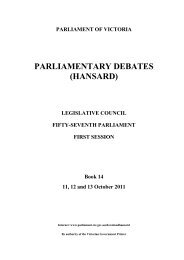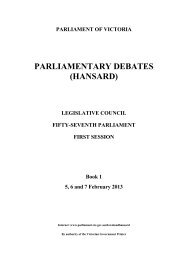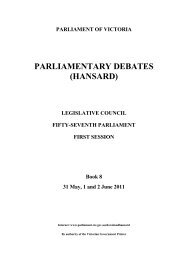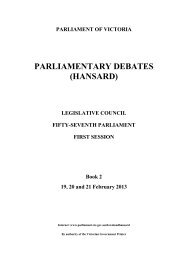Inquiry into the Road Safety Amendment (Car Doors) Bill 2012 Final ...
Inquiry into the Road Safety Amendment (Car Doors) Bill 2012 Final ...
Inquiry into the Road Safety Amendment (Car Doors) Bill 2012 Final ...
Create successful ePaper yourself
Turn your PDF publications into a flip-book with our unique Google optimized e-Paper software.
The sponsor of <strong>the</strong> <strong>Bill</strong>, Mr Greg Barber, MLC, stated: 27<br />
Chapter 2: Legislative framework and enforcement<br />
[The] Minister can tomorrow gazette <strong>the</strong> exact same penalties associated with that<br />
through regulation. It does not need my <strong>Bill</strong>. They could have done it at any time since<br />
this issue has arisen. He can do it tomorrow, take <strong>the</strong> wind out of my sails and remove<br />
<strong>the</strong> need for my <strong>Bill</strong>. That is entirely possible.<br />
Fur<strong>the</strong>r, Mr James Holgate, Director of <strong>Road</strong> User <strong>Safety</strong> at Vic<strong>Road</strong>s stated: 28<br />
We understand that Mr Barber’s only avenue for change is through legislation; I guess<br />
that was <strong>the</strong> catalyst for this <strong>Bill</strong>. The fact remains that <strong>the</strong> offence is currently in<br />
regulations; I must admit we do not see any justification for moving it from a regulation<br />
<strong>into</strong> <strong>the</strong> Act.<br />
The Committee supports <strong>the</strong> views of Vic<strong>Road</strong>s and Victoria Police and believes moving <strong>the</strong><br />
offence from <strong>the</strong> regulations to legislation is an unnecessarily complicated way of achieving <strong>the</strong><br />
<strong>Bill</strong>’s stated objectives. As Mr Barber noted was possible, changes to <strong>the</strong> penalties have since<br />
been made by amendments to <strong>the</strong> regulations. The Committee believes this has been an effective<br />
way of achieving <strong>the</strong> <strong>Bill</strong>’s objective, and it is not necessary to move <strong>the</strong> offence to legislation.<br />
Finding 1<br />
The offence proposed by <strong>the</strong> <strong>Bill</strong> already exists in <strong>the</strong> <strong>Road</strong> <strong>Safety</strong> <strong>Road</strong> Rules 2009.<br />
Following changes made to <strong>the</strong> regulations on 31 July <strong>2012</strong>, <strong>the</strong> maximum penalty for <strong>the</strong><br />
offence has been increased to 10 penalty units in line with <strong>the</strong> increased penalty proposed<br />
by <strong>the</strong> <strong>Bill</strong>.<br />
2.4 Enforcement procedure<br />
<strong>Road</strong> Rule 269(3) can be enforced in one of two ways. Victoria Police can issue an on-<strong>the</strong>-spot fine<br />
(infringement notice), or <strong>the</strong> offender can be charged and be required to appear at <strong>the</strong> Magistrates’<br />
Court, where <strong>the</strong> Magistrate can issue a penalty up to <strong>the</strong> maximum penalty.<br />
2.4.1 Infringement offences<br />
The Committee has examined <strong>the</strong> enforcement options for <strong>the</strong> offence, and whe<strong>the</strong>r is appropriate<br />
for it to remain a lodgeable infringement offence or whe<strong>the</strong>r in all cases <strong>the</strong> matter should be taken<br />
to <strong>the</strong> Magistrates’ Court for determination.<br />
A number of submissions to <strong>the</strong> Committee emphasised <strong>the</strong> need for <strong>the</strong> offence to remain an<br />
infringement offence in <strong>the</strong> interests of efficiency of <strong>the</strong> enforcement process. In his submission to<br />
<strong>the</strong> Committee, <strong>the</strong> Chief Magistrate stated: 29<br />
The infringements system provides a considerable time and cost benefit to <strong>the</strong><br />
Magistrates’ Court, prosecution agencies and infringement offenders. It enables<br />
parties to avoid attendance at court where <strong>the</strong> infringement is not disputed, which<br />
ensures court resources can be redirected to o<strong>the</strong>r high demand areas.<br />
In evidence to <strong>the</strong> Committee, Superintendent Robert Stork supported this view: 30<br />
In relation to <strong>the</strong> change in <strong>the</strong> process for enforcing car door offences and having<br />
<strong>the</strong>m dealt with by <strong>the</strong> Magistrates Court … we would request that <strong>the</strong> infringement<br />
remain. In relation to efficiency and utilisation of <strong>the</strong> justice process in terms of<br />
productivity, lost time and service to <strong>the</strong> community, that would create a burden on <strong>the</strong><br />
courts. It would certainly create a burden on police members.<br />
27 Mr Greg Barber, MLC, Transcript of Evidence, 28 March <strong>2012</strong>, p. 4.<br />
28 Mr James Holgate, Vic<strong>Road</strong>s, Transcript of Evidence, 2 May <strong>2012</strong>, p. 13.<br />
29 Magistrates’ Court of Victoria, Submission No. 87, p. 2.<br />
30 Superintendent Robert Stork, Victoria Police, Transcript of Evidence, 2 May <strong>2012</strong>, pp. 22-3.<br />
15



